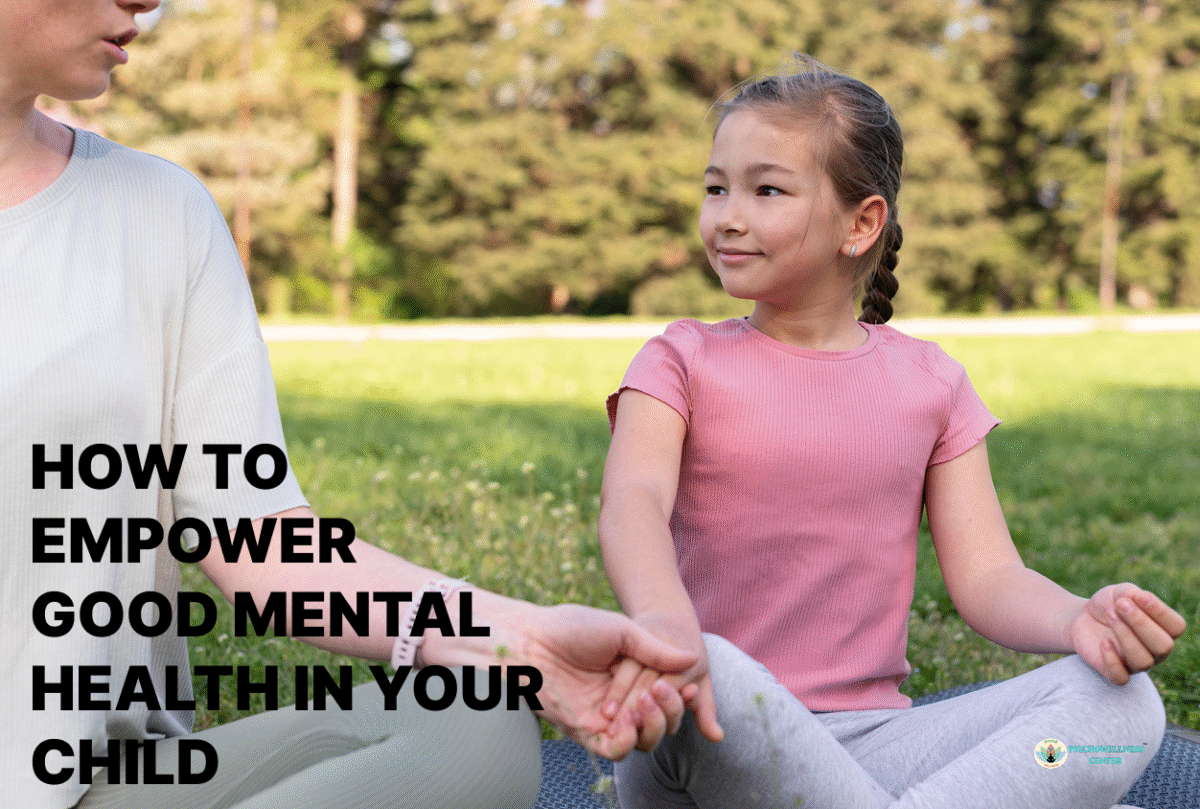In a world that constantly demands performance, attention, and perfection, ensuring your child’s mental health is not a luxury—it’s a necessity. Emotional well-being is the cornerstone of a child’s development, influencing how they learn, grow, and relate to others throughout life. As caregivers, educators, or parents, you are your child’s first mental health mentors. Your words, actions, and consistency provide the emotional blueprint they will use to understand themselves and the world. Here is a comprehensive guide on empowering good mental health in children using practical, evidence-based strategies.
- Build a Secure Emotional Foundation
Children need to feel loved, accepted, and safe to develop emotionally.
How:
- Show unconditional love, independent of achievements or behaviour.
- Be present and emotionally available when they express feelings.
Why it matters: A secure emotional foundation helps build self-confidence and trust, setting the stage for healthy emotional regulation and stronger relationships.
2. Normalise Mental Health Conversations
Discussing emotions should be just as common as talking about physical health.
How:
- Use emotional vocabulary in everyday conversations.
- Share your own feelings appropriately to model openness.
- Read books that explore emotional themes to help them understand complex feelings.
Why it matters: Early conversations promote mindfulness and emotional literacy—skills essential for self-awareness and well-being.
3. Create a Safe and Predictable Environment
Children thrive in spaces that feel structured and reliable.
How:
- Establish daily routines for meals, play, and sleep.
- Communicate any changes in routine to avoid surprise or confusion.
- Use positive reinforcement rather than punishment.
Why it matters: A consistent environment reduces stress, builds security, and supports healthy development.
4. Encourage Creative Self-Expression
Creativity helps children process emotions and discover their identity.
How:
- Offer materials like crayons, journals, or musical instruments.
- Allow time for unstructured, imaginative play.
- Let them make small decisions to promote independence.
Why it matters: Expression through art or play fosters emotional release and helps children develop a healthy body image and identity.
5. Teach Emotional Regulation and Coping Skills
Children need tools to manage intense emotions constructively.
How:
- Practice breathing techniques together.
- Create a “calm-down corner” or toolkit with soothing items.
- Model positive self-talk and problem-solving strategies.
Why it matters: Emotional regulation boosts resilience and prepares them for future social and academic challenges.
6. Prioritise Healthy Living Habits
Physical health directly impacts mental well-being.
How:
- Reduce screen time, especially before bed.
- Create tech-free zones during meals or bedtime.
Why it matters: A healthy lifestyle supports brain function, emotional stability, and greater energy—especially important when facing low motivation.
7. Encourage Independence and Problem-Solving
Empower your child to think critically and make choices.
How:
- Ask questions like, “What do you think would help right now?”
- Allow them to solve age-appropriate issues without immediately stepping in.
- Celebrate their efforts rather than only their outcomes.
Why it matters: This builds confidence, autonomy, and assertiveness, laying the groundwork for lifelong coping abilities.
8. Support Healthy Social Relationships
Connection with peers is vital for emotional development.
How:
- Teach sharing, listening, and conflict resolution through role-play.
- Monitor for signs of isolation or bullying.
- Encourage open discussions about friendship and social boundaries.
Why it matters: Positive relationships enhance empathy, reduce loneliness, and teach vital communication skills.
9. Be Aware of Warning Signs and Seek Help Early
Proactive support can prevent emotional issues from escalating.
Watch for:
- Withdrawn behaviour, aggression, or drastic mood shifts
- Frequent nightmares or changes in sleep patterns
- Academic decline or school refusal
What to do:
- Gently open dialogue and listen without judgment.
- Consider professional counselling or child-focused therapy for further support.
- Use both in-person and digital resources to access help easily.
Why it matters: Early intervention improves long-term outcomes and reinforces that it’s okay to ask for help.
10. Model the Mental Wellness You Want for Your Child
Youngsters learn more from your actions than from your words.
How:
- Talk about your own mental health practices (“I’m journaling to help clear my thoughts.”)
- Avoid negative self-talk in front of them.
- Show gratitude, patience, and adaptability.
Why it matters: Demonstrating healthy behaviour and self-esteem provides a living example of how to manage life with grace.
Conclusion
Good mental health isn’t about being happy all the time—it’s about having the tools to navigate life’s ups and downs. Raising a mentally strong child doesn’t require perfection; it requires intention, love, and a commitment to self-improvement—for both parent and child. For those struggling to find stillness amidst the noise, the Psychowellness Center, located in Dwarka Sector-17 and Janakpuri, offers in-person counselling with experienced psychologists, including some of the best psychologists near me. They can guide you and your child toward a more grounded and emotionally connected life. Additionally, TalktoAngel offers secure and confidential online counselling, making support accessible even for the busiest families. Both services are dedicated to nurturing mental wellness and helping families reconnect in a fast-paced world. So pause. Breathe. Reconnect with your child. And remember—it’s possible to be a nurturing parent and a work in progress at the same time, all while honouring your child’s growth and your own.
Content contribution by Dr. R.K. Suri, Clinical Psychologist, and Ms. Tanu Sangwan, Counselling Psychologist, trusted experts at Psychowellness Center.
References
- American Psychological Association. (2020). Publication manual of the American Psychological Association (7th ed.). https://doi.org/10.1037/0000165-000
- Centres for Disease Control and Prevention. (2022). Children’s mental health. https://www.cdc.gov/childrensmentalhealth/index.html
- National Institute of Mental Health. (2022). Child and adolescent mental health. https://www.nimh.nih.gov/health/topics/child-and-adolescent-mental-health

